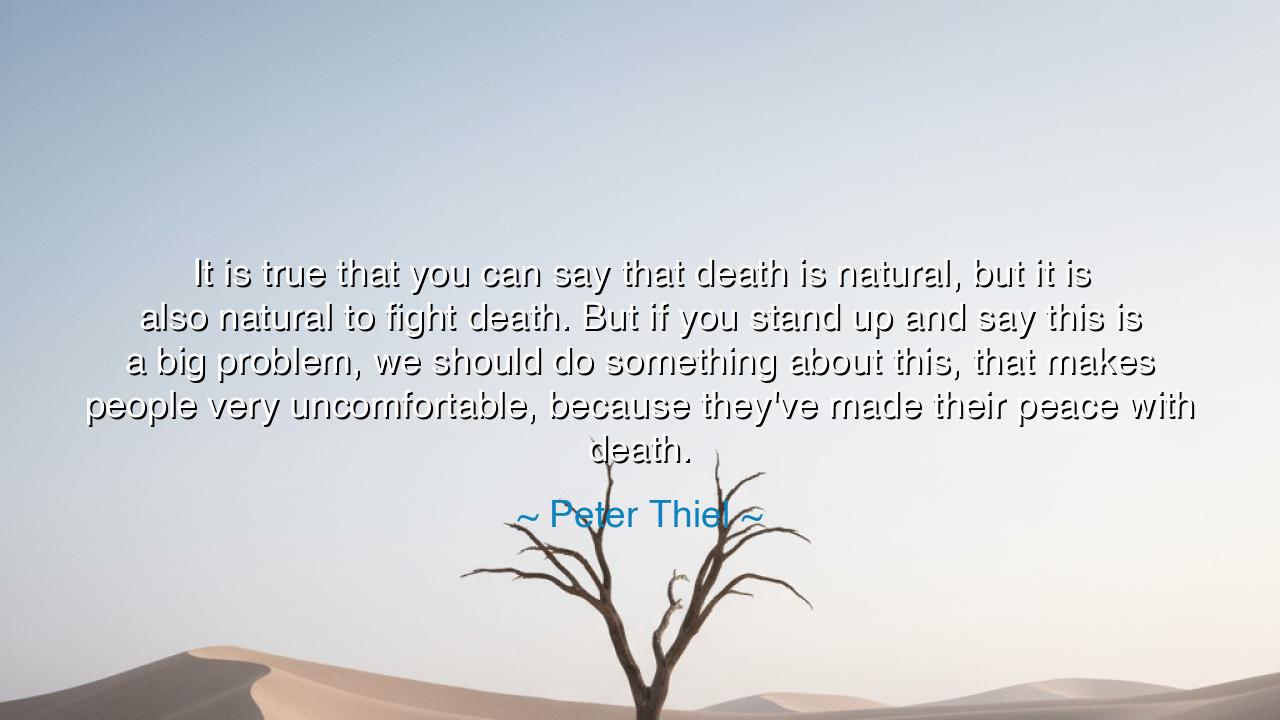
It is true that you can say that death is natural, but it is also
It is true that you can say that death is natural, but it is also natural to fight death. But if you stand up and say this is a big problem, we should do something about this, that makes people very uncomfortable, because they've made their peace with death.






“It is true that you can say that death is natural, but it is also natural to fight death. But if you stand up and say this is a big problem, we should do something about this, that makes people very uncomfortable, because they've made their peace with death.” Thus spoke Peter Thiel, a man of bold thought and restless curiosity, who gazed upon the oldest shadow known to humankind — death — and dared to question whether it must be accepted at all. In these words lies a deep and unsettling truth: that the same race which conquered mountains, tamed oceans, and unlocked the power of the stars has strangely accepted its own extinction as inevitable. Thiel’s voice calls to the ancient spirit of man — the will that refuses to bow before fate — and asks, “Why must we make peace with that which ends all peace?”
In the long story of humankind, death has always stood as the final tyrant, the conqueror none could overthrow. The poets of Greece called it Ananke, necessity — the one thing even the gods themselves could not escape. To die was considered natural, and therefore, beyond question. Yet, as Thiel reminds us, it is equally natural to fight death, for within every living creature burns the instinct to survive. The newborn gasps for breath, the wounded soldier clings to life, the aging heart beats on despite its pain. Life itself is rebellion against decay. To call death “natural” is true — but to resist it is the essence of what it means to be alive.
And yet, Thiel laments, when one dares to say that death is a problem, the world grows uneasy. Why? Because to challenge death is to disturb a comfort that has settled over humanity like dust — the comfort of resignation. People have built philosophies, religions, and rituals to make peace with mortality, to soften its blow. To live without that acceptance would mean to live in a state of holy unrest, a constant striving for renewal. Thiel, in this, stands in the tradition of the ancient Prometheus, who stole fire from the gods so that humanity might rise from darkness. Just as Prometheus defied divine decree, so does Thiel urge us to defy the quiet surrender to death.
Throughout history, the great innovators have been those who refused to accept what others called “natural.” It was Hippocrates, father of medicine, who first looked upon disease — once thought to be the will of the gods — and said, “No, this too can be healed.” It was Galileo, who looked upon the heavens — once thought immutable — and said, “No, they move.” And so, Thiel’s challenge echoes in their spirit: if all progress is born of defiance, why should the end of life itself be exempt? To seek to extend life is not arrogance, but devotion — the will to preserve the most sacred gift ever given.
Still, the discomfort Thiel speaks of runs deep. Many feel that to fight death is to trespass upon the realm of the divine, or to invite sorrow by denying what must be. But such fear is not wisdom — it is weariness. It is the sigh of those who have forgotten that every great act of civilization was once deemed impossible. The same voice that whispers “accept your fate” once told man not to cross the sea, not to fly through the air, not to reach for the moon. Each time, that voice was silenced by courage. Thus, to question death is not to reject nature, but to fulfill it — for nature itself drives us to struggle, to endure, to reach ever upward toward the eternal.
Consider Gilgamesh, the ancient king whose story is one of the earliest known to humankind. After the death of his friend Enkidu, he was struck by terror of his own mortality. He journeyed across oceans and deserts seeking the secret of eternal life. Though he failed to find immortality, his quest gave birth to wisdom — that the longing for eternity is written into the heart of man. Thiel’s words are the modern echo of that same cry. Though the tools are different — science instead of myth — the yearning remains the same: to overcome death, or at least, to refuse to bow before it without a fight.
Lesson: Do not be quick to make peace with limitation. Question what others accept. Whether in science, in art, or in the quiet battles of your own life, resist the temptation to surrender to what seems inevitable. Fight not only for more years, but for deeper years — years filled with meaning, courage, and creation. Let the struggle against death, whether literal or symbolic, awaken in you a fiercer love of life.
For as Peter Thiel reminds us, it is natural to fight death — not only the death of the body, but the death of the spirit, the death of ambition, the death of wonder. So live as one who travels through a fleeting world yet refuses to fade quietly into its dust. For the fire of life, once kindled, was never meant to be extinguished, but to burn — defiantly, brightly, eternally.






AAdministratorAdministrator
Welcome, honored guests. Please leave a comment, we will respond soon